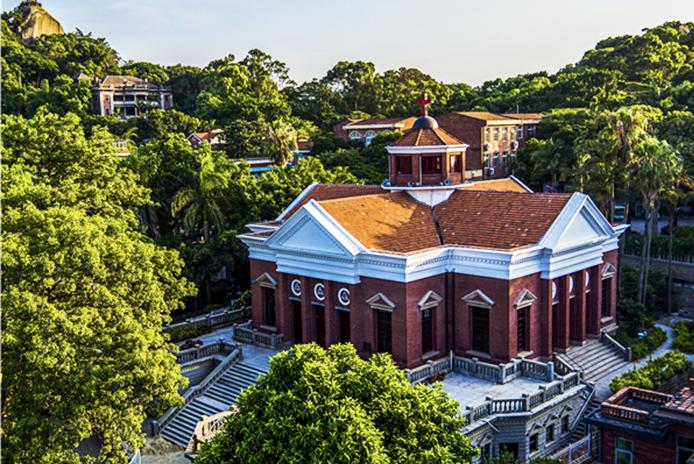John Stronach was the first missionary from London to come to Xiamen to preach. He was born in Edinburgh, Scotland in 1810, and was employed as a pastor after graduating from the Glasgow Theological Seminary.
In the 1837, Stronach was sent to teach in the South Pacific region, where he preached the gospel for seven years in the Chinese community in Singapore, Java and Borneo. He learned the Hakka dialect of Chinese, laying a good foundation for future missions in Xiamen and Minnan.
In July of 1844, Stronach with his wife Margaret landed on Gulangyu Island, opening the prelude to the Mission in Minnan from London.
They built three two-storey buildings in and around the Jiqi region and founded Christian elementary schools, one of which, as a church became the earliest chapel of Gulangyu Island. In addition to it being a place for Sunday worship, it was the classroom of the primary school known as the "Evangelical Primary School" for the remaining six days. The school, was run by Chinese as teachers initially with 20 or 30 students, which was the earliest Western-style school in Gulangyu. The upper floor of the building served as a living room and bedrooms for pastors.
Soon Stronach extended the teaching to Xiamen by preaching at the Dragon Women's Wharf in the Liao Tsai. Reverend Stronach saw that Xiamen desperately needed co-workers so he constantly called for more missionaries to Xiamen.
In the 1846, his brother Alexandra, sister Catherine, and the Lin couple came to Xiamen to preach. The Stronach siblings worked together in Xiamen to contribute a lot to the cause of the gospel. In 1847, Stronach travelled to Shanghai to work on the translation of the Bible into Chinese, and his ministry was handed to Alexander. In 1848, a gardener, Wu Tu, and his son were baptized, being the first fruit of the London mission after which several locals and others were baptized, becoming the first group of believers of the London mission's ministry in Xiamen.
In Shanghai, Stronach, Madus, Chan Zhiwen, Lee Jacob and other Anglo-American missionaries formed the "Committee on Bible Translation Versions" to engage in the translation of the Bible into Chinese.
However, in the process of translation, they had a dispute over the Chinese translation of the word for "GOD". British missionaries, represented by Stronach and Madus, followed Matteo Ricci's claim to translate "God" as "上帝." (translator's note: the king or emperor who is above all creation)It is believed that there was a concept similar to the "highest existence" of the Christian faith in the ancient period of China, and that the word "God" in Chinese classics such as "Shang Shu" and the "Book of Poems" is the embodiment of this concept. It was only later transformed by Confucianism and Buddhism that it was distorted, and there emerged atheistic or polytheistic beliefs. The American missionaries, represented by Chan Zhiwen and Wenhuilian, objected to the translation, believing it to be without God's special revelation in which man could not really know him. They believed the concept "上帝" was not a correct understanding of the creator, and rather the worship of an idol, so therefore advocated for the use of the translation of "神".(translator's note: the highest supreme being rather as deity or theo)
After a long period of debate, both sides were unable to reach an agreement, so the American missionaries withdrew from the project. British missionaries such as Stronach, Madus and Lee Jacob continued with the translation ministry, and published the New Testament in 1852 and the Old Testament in 1854. Of the Chinese Bibles published today, readers can still see that there is a note on the inner page explaining where the version of "神" can also be called "上帝".
In the 1853, Stronach returned to Xiamen. The London mission's ministry was revived in 1855 after 77 people were baptized. Since the London mission's ministry had no church of its own at that time, they had to borrow churches such as New Streets and Bamboo Trees of the US in order to baptize new believers. As the number of new believers increased, Stronach and his co-workers had the idea of establishing churches. In the 1860, London mission's ministry established Taishan Chapel in Tai Shankou (Zhongshan Road) as its first chapel in Xiamen. Two years later, a second church (the Guanyinei Chapel) was established. Stronach and his co-workers promoted the autonomy of the Chinese church, and in January 1873, under his chairmanship, two Chinese were appointed to the Taishan Chapel as the first Chinese pastors. On February 22, Stronach and his co-workers held a meeting in the Guanyinei Chapel to connect southern Fujian of the district, establishing the Hakka Joint Congregation to promote the development of teaching in the Hakka dialect.
Stronach and his co-workers based on Xiamen Island actively spread the gospel to the surrounding areas. Guankou established a church and many preaching points mainly in Tsuruoka (now Xinglin Gaopu), Jiaowei, and Huyu. In the 1870, Stronach was asked to go to Horse Lane to set up a church.
Since then, the church began to flourish with a growing number of believers and set up meeting points in different places.
Zhangquan was also left to follow in the footsteps of the missionary Stronach. He successively participated in the establishment of churches in Shanqian, Wangchuan, Shanyao, and Dongkeng.
Stronach also wrote books such as The Biography of the Hospice (1846) and Excerpts from the Old Testament (1857) during his mission in Xiamen. In 1878, Stronach retired and left Xiamen. In 1888, he passed away in Philadelphia, Pennsylvania, USA.
- Translated by Charlie Li












